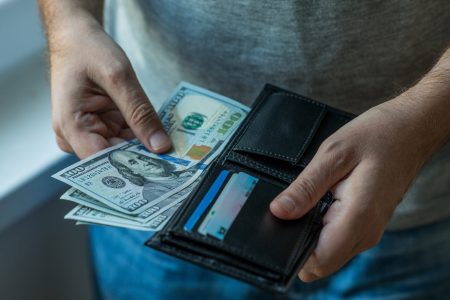Key takeaways
- While credit card companies technically have the ability to pursue your home for unpaid debt, it’s rare.
- A debt collector must go to court and get a judgment before it can place a lien on your home.
- There are limits and exemptions to how much of your home’s equity a debt collector can claim.
Financial stressors — including inflation, an inability to save and rising debt — can put a strain on consumers. Nearly half (46 percent) of American credit cardholders are now carrying debt from month to month, according to Bankrate’s 2025 Credit Card Debt Report.
People who have credit card debt can face challenging financial consequences, including an inability to cover emergency expenses, a harder time building wealth and a lower credit score that makes dealing with debt more difficult and expensive.
It may sound extreme, but lenders — including credit card issuers — could even come after your home to settle your debts. Here’s a breakdown of what that would look like, as well as the laws surrounding the process:
Can lenders take my home due to unpaid credit card debt?
The short answer is yes, but not directly. Instead of seizing your home outright, a lender can potentially force you into foreclosure if they get a court judgment against you. This would mean that the lender gets paid back after your home has been sold off. The good news? While credit card issuers can technically pursue foreclosure of your home for unpaid debt, experts say it’s rare.
J.D. Koontz is a 20-year banking expert who offers litigation support to attorneys for debtors and creditors. His clients include Bank of America, JPMorgan Chase Bank, Wells Fargo Home Mortgage, Equifax and Countrywide Home Loans. Of this type of debt collection situation, he says:
I can recall only one instance where a creditor pursued a credit card borrower. The balance owed was $65,000, quite a significant amount. In most cases, when balances are smaller, creditors typically charge off the debt rather than pursue legal action.
— J.D. Koontz
CRC and banking expert
Why can’t a lender seize my home directly?
A credit card company generally cannot come after your house directly because credit card debt is unsecured debt, meaning it’s not tied to a specific asset like a home, says Koontz.
Secured debt vs. unsecured debt
The difference between secured debt and unsecured debt is meaningful. Secured debt is debt that is backed by property, such as a mortgage loan for a house or an auto loan backed by a car. If you don’t make payments on your auto loan, your lender could repossess the car. And if you become delinquent on your mortgage payment, your lender could foreclose on your house.
“Mortgages and deeds of trust are types of security agreements that tie a loan to collateral such as a home. However, it is possible that if the credit card company sues you and wins a judgment, it could be able to place a lien on your home. This could affect your property when you try to sell or refinance. In extreme cases, a lien may lead to foreclosure, but that’s uncommon for smaller debts. It’s always best to seek legal advice if you’re in this situation.”
— J.D. Koontz, CRC and banking expert
Other types of debt, such as student loans and medical debt, are unsecured. In common law states such as New York, a person would generally not be responsible for their spouse’s credit card debt that is not in their name. However, the card companies can pursue the cardholder’s share in jointly owned property to fulfill the debt.
What is the legal process like for a creditor going after my home?
Before a debt collector can touch your home equity, it has to go to court and get a judgment against you. If you are notified about a court case against you, take appropriate action so you stay on top of the proceedings. For one, you may be served with court papers that typically set up deadlines for you to respond.
There is also a defined period of time beyond which a debt collector cannot legally pursue a debt, called a statute of limitations. If you don’t go to court to make your case, the court could well rule in favor of the debt collector so they can continue the collection proceedings anew.
If the debt collector prevails in a court of law, it would get a judgment against you. That’s when it could place a judgment lien on your house. In New York, for example, a judgment is valid for 20 years, according to Legal Assistance of Western New York. This means the debt can be collected on for up to 20 years or until it is paid off.
If you have a mortgage on your house, that’s also a lien against it. There can be more than one lien on a house. For example, a home contractor could have placed a mechanic’s lien if they did not get paid for work done on the property.
Homestead exemptions
The mechanics of collecting on a judgment vary by state, as well as the maximum amount of lien that can be placed. The good news is there are homestead exemptions that vary by state, protecting a certain portion of your home equity from court judgments. In New York, the exemption runs to $150,000 for those in New York City and certain Westchester and Long Island areas. It varies from $75,000 to $125,000 for other areas of the state. Married people get double this exemption.
Most creditors will not force you to sell your house to pay a judgment lien. It may not be worth the trouble considering that a judgment lien will typically be paid off only if there’s any money left over after paying other types of liens and after applying the homestead exemption.
What credit card companies can’t do when it comes to debt collection
Consumer rights fall under the Fair Debt Collection Practices Act (FDCPA). This law regulates how creditors and debt collectors can interact with you regarding debt collection. Debt collectors are not allowed to:
- Call you between 9:00 p.m. and 8:00 a.m.
- Contact you at your workplace if you’ve requested they refrain from doing so.
- Disclose your debt to anyone else, such as a coworker.
- Harass, threaten or verbally abuse you.
If a debt collector breaches any of these, remind them about the FDCPA. Also, consider filing a complaint with the Consumer Financial Protection Bureau (CFPB).
Keep in mind:
Due to the Trump Administration’s attempts at closing down the CFPB in 2025, the organization’s efficiency and reach have been heavily impacted. Consider following up your CFPB complaint with one to your local District Attorney, as well.
The bottom line
In extreme cases, a creditor may place a lien on your property that could lead to foreclosure. But, while credit card companies can technically go after your home in this way to pursue debt, it’s rare for them to actually do so, especially for smaller debts. The process is usually too expensive and time-consuming to bother.
Should you find yourself in this situation, seek legal advice from an attorney specialized in debt collection law.
Why we ask for feedback
Your feedback helps us improve our content and services. It takes less than a minute to
complete.
Your responses are anonymous and will only be used for improving our website.
Help us improve our content
Read the full article here












